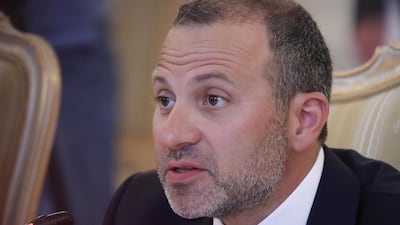The US sanctioned Lebanon's most powerful Christian leader Gebran Bassil on Friday for corruption and for ties with Iran-backed Hezbollah.
The move may harm Mr Bassil's political party and ambitions but will have little impact on local politics, party supporters and Lebanese analysts told The National.
“To tell you the truth, it won’t make a difference for many reasons,” said Hilal Khashan, a political science professor at the American University of Beirut.
"Lebanese politicians are not sensitive to criticism or sanctions. President Macron came twice to Lebanon and spoke to them in very harsh terms but they do not care."
Mr Macron has tried in the past months to pressure Lebanon's political class to reform in exchange for much-needed financial aid but his efforts have yielded no results yet.
Politicians have done little to respond to the country's severe financial crisis that started mid-2019 and has pushed more than half the population into poverty.
Mr Bassil, who has held various ministerial portfolios in the past decade and leads the largest parliamentary bloc, is “the strongman of Lebanon,” said Mr Khashan. “No deal can be processed without his hand in them,” he said.
Mr Bassil, 50, was sanctioned under the Magnitsky Act which targets political corruption.
In a press release the US department of state wrote that “in 2014, while Minister of Energy, Bassil was involved in approving several projects that would have steered Lebanese government funds to individuals close to him through a group of front companies".
Mr Bassil is barred from entering the United Sates. Any assets he owns in the US will be frozen.
Mr Bassil reacted to the US sanctions on Friday by tweeting that they “do not scare” him. “I will not save myself to destroy Lebanon. I have become accustomed to injustice,” he wrote.
Blow to Bassil's political ambitions
Political analyst Imad Salamey warned that the sanctions could deal a severe blow to Mr Bassil's political party, the Free Patriotic Movement, by singling him out as a "persona non grata". "A lot of people will not want to be associated with Bassil politically," he told The National.
Mr Bassil has been rumoured to hope to succeed his father-in-law President Michel Aoun, 85.
“Any US funds or economic activities with him will be forbidden, so there could be legal implications to anyone dealing with him. This could seriously jeopardise his presidential ambitions,” said Mr Salamey.
Hezbollah is labelled as a terror organisation by the US and is the country’s only party that also wields a powerful regional militia.
In a press released published Friday evening, the party called the sanctions a “blatant interference in the internal affairs of Lebanon”.
But the US move will probably not affect ongoing discussions to form a cabinet by the Prime Minister designate, Sunni Muslim leader Saad Hariri, according to most sources The National spoke to.
A pro-Western figure, Mr Hariri was nominated on October 22 after the previous government resigned in the wake of a devastating explosion on August 4 at Beirut port that killed 204 people.
Mr Hariri has consulted with all political groups, including with Mr Bassil. Ongoing discussions are focusing on the number and distribution of ministries among sectarian groups. The process usually takes months.
Business 'as usual'
“The FPM has been anticipating these sanctions,” said Mr Salamey. “There will be some political irritations, some shadows on the future career of Bassil and his presidential ambitions. But business will continue to run as usual.”
Rumours of sanctions on Mr Bassil have been circulating for months in local and international media and come two months after the US targeted two former Lebanese ministers, including a Christian figure from another political party, over similar claims.

"It's not a surprise at all," said a senior member of the FPM's youth movement, who spoke to The National on condition of anonymity. "It will change nothing. We're going to continue our life just as it is … If he [Mr Bassil] has any assets [in the US], let them freeze them. It won't be the end of the world."
Several high-profile party members declined to speak on the topic when approached by The National.
Mr Bassil emerged as the most vilified public figure among the hundreds of thousands of anti-government protesters who took to the streets in October 2019.
They blamed all of Lebanon’s political class for widespread corruption and causing the country’s current economic crisis but used particularly colourful language against Mr Bassil.
The widely chanted insults shocked his supporters, who say today that the sanctions heaped on him by the US are yet another example of their leader being unfairly targeted.
"I'm very upset," Christina El Hage, a 27-year old marketing manager, told The National. "I do not believe that these sanctions are established on any strong basis. We need to see proof of corruption."
"If it’s because of affiliation to Hezbollah, the Free Patriotic Movement [Mr Bassil’s party] does not provide neither money nor weapons to Hezbollah,” she said. “It makes me want to defend this guy [Mr Bassil] even more.”
“Who does not speak to Hezbollah in Lebanon?” continued Ms El Hage. “Hezbollah has been part of all of [Saad] Hariri’s government lately. Why isn’t Hariri sanctioned? Why not [Parliament Speaker] Nabih Berri, who has been their ally for the past 30 years?”
Hezbollah unavoidable, argues Bassil
Due to Lebanon’s consensus power-sharing system, all Lebanese political parties represented in the government, which includes Hezbollah since 2005, cooperate with each other.
Speaking to the Wall Street Journal, which first reported on the sanctions on Friday, Mr Bassil made similar comments earlier this year. "Everybody should be sanctioned in Lebanon, because everybody deals with Hezbollah in Lebanon, on all terms," he said.
But the FPM, founded by Mr Aoun, is Hezbollah’s most influential non-Shiite Muslim ally and has been accused by its detractors of providing a “Christian cover” to the party.
In 2006, the FPM sealed a partnership with Hezbollah that helped Mr Aoun become President a decade later.


